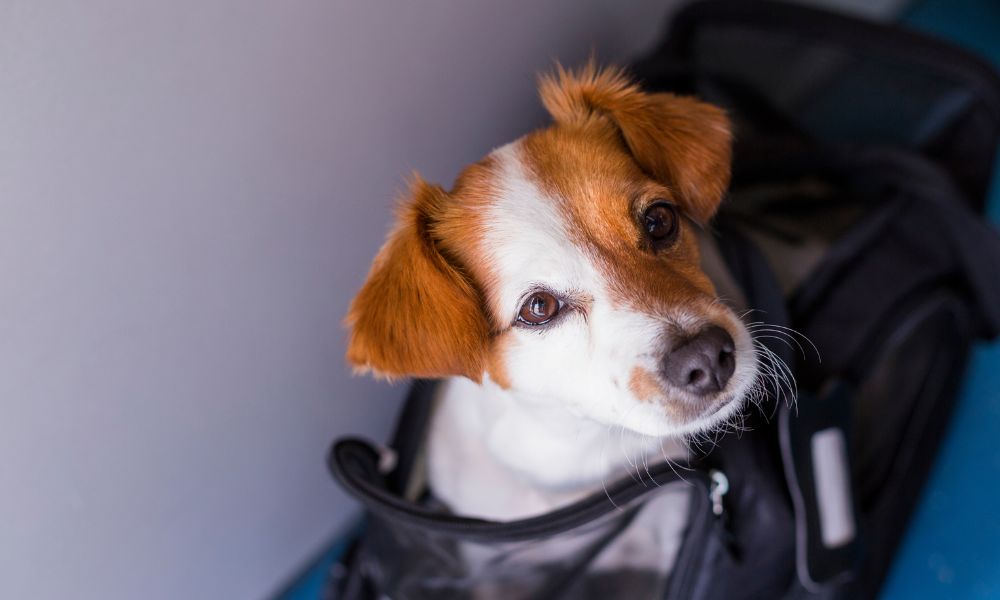How To Choose the Ideal Carrier for Your Dog
Posted by Jeff Porter on
Whether you’re leaving your dog at home for a few hours or taking them on a road trip, you may need a way to keep them from wandering the house or car. Traveling with your pet can be both enjoyable and stressful, but you can make it much easier when you make the necessary preparations. Suppose you’re going on a road trip and taking your pup with you; you’ll need a way to secure them in the car for the safety and comfort of everyone involved. Many people think that all pet carriers are the same, but that’s not always the case. Follow along to learn how to choose the ideal carrier for your dog to make your trips and travels much smoother.
Measure Your Pup
Before choosing a carrier for your dog, measure them to get their precise measurements. If you have a growing puppy, you should know that their size will likely change as they mature. With that said, the carrier must be large enough for your four-legged friend to stretch out, stand up, and easily turn around at their current size. You may have to reevaluate their carrier situation as they grow and find a larger one. Fortunately, pet carriers come in many dimensions to accommodate dogs of all sizes.
When determining what size your dog needs, measure their length, height, and weight.
- Length: Measure from the base of their neck to the start of their tail to get an idea of how long their body is. Next, add about six inches to your measurement to account for their head and tail.
- Height: When your pup is sitting, measure from the floor to the top of their head to calculate their height.
- Weight: Your dog’s weight is the easiest to measure; you just need to get them on a scale to obtain their weight. Most carriers offer a weight range to ensure it can effectively accommodate your pup.
Now that you have all the necessary measurements, you can continue finding the perfect carrier for your furry friend. The material is the next thing to consider.
Consider Different Materials
Interestingly, dog carriers come in various materials, meeting the needs of every dog owner. Instead of purchasing the first carrier you see, consider the different materials you can choose from. Some are best for comfort, while others are great for durability. If you have a large dog or one that tends to chew through things, you should consider getting a carrier with the strongest material. Here’s a short list of carrier materials:
- Nylon
- Mesh
- Hard plastic
- Metal wire
What Do You Need It For?
Next, you must determine what you’ll use the carrier for. Suppose you want a carrier to keep your pup safe on a road trip; you may need one that can strap into your car like a car seat. On the other hand, consider a soft-sided mesh carrier if you plan to fly with a smaller dog. This way, they can easily fit in the cabin with you like a carry-on. However, you should opt for a sturdy, metal wire or hard plastic kennel if you plan to fly with a larger dog because they’ll have to go in a separate cargo area.
Furthermore, you may need a way to carry your pup with you on a hike if they cannot walk the whole way. With that in mind, you should use a mesh or nylon backpack-style carrier to easily carry your dog on your back as you continue down the hiking trails. Before making your carrier decision, consider making a list of uses and pros and cons to narrow down what’s most important for you.
Choose Your Carrier Style
When it comes to dog carriers, you have plenty of options to choose from, regardless of your needs. Look at the different carrier styles to decide which option will be best for you and your four-legged friend.
Soft-Sided Carriers
Soft-sided carriers are the perfect option for those who need to take it from the house to the car to an airplane. Because they’re flexible and easy to move, foldable dog kennels are the best options for families who enjoy traveling with their dogs. Furthermore, this type of pet carrier is typically very lightweight.
Hard-Sided Carriers
Hard-sided carriers, also known as kennels, are great options for larger dogs who have the strength to tear their way out of soft materials. However, these metal or hard plastic carriers tend to be relatively heavy and bulky, making them more difficult to move frequently. If you choose a hard-sided carrier for your larger pup, ensure the model has proper ventilation.
Backpack Carriers
Backpack carriers are like regular hiking backpacks that are large enough to hold your essential items and your four-legged friend. A backpack carrier is the best option for dogs that like to be close to their owners or can’t walk for long distances.
Sling Carriers
A sling carrier is a soft fabric wrap that holds a small pup near their owner’s body. This is an excellent option for those with new puppies, timid dogs, and those who want a few extra cuddles. Believe it or not, sling carriers are a good choice whether you’re doing chores around the house or running errands.
Other Considerations
Aside from choosing the material and style of the dog carrier, you should also think about a few more things before making your final decision. Follow along to explore a few matters you might still need to consider.
Accidents
Puppies have accidents, which you should consider in your carrier decision. For instance, you should choose something easy to clean if your dog still has frequent accidents. Hard plastic or washable fabrics are the best carrier materials for this.
Pet Temperament
Your pet’s temperament is another important thing to consider. Suppose you have an extremely anxious dog; they may have a better experience with a carrier with more visibility, depending on their fears. On the other hand, a pup that doesn’t like restraint may not do well with a carrier with a window for them to see out of.
Quality and Sturdiness
Quality and sturdiness are other essential factors, as you don’t want to spend tons of money on something that won’t last. Sturdiness may be incredibly important for dogs that are rough on their belongings.
After learning how to choose the ideal carrier for your dog, you can select the best one to suit your and your pup’s needs. Whether for home or travel, every dog should have a carrier.




 Verified Purchase
Verified Purchase
 Catalog
Catalog
